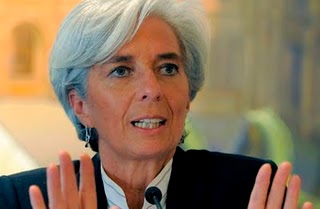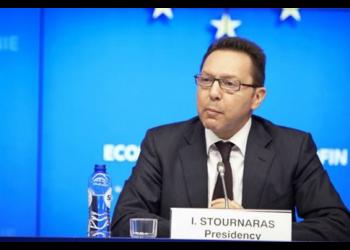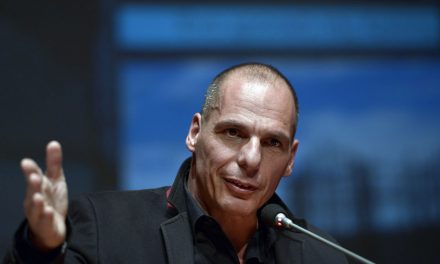By IAN TALLEY of Dow Jones Newswires
The International Monetary Fund executive board Tuesday officially named Christine Lagarde as the next IMF director, after the French finance minister won late support from the U.S. and several major emerging-market nations.
The decision hands the managing director’s role to a minister playing a critical role in negotiating financing for Europe’s sovereign-debt bailouts, a crisis that threatens to rupture a fragile global recovery. Lagarde will also enter arguably one of the world’s most powerful financial positions as economists warn that sluggish restructuring of the financial system risks creating future banking perils and unbalanced growth in the global economy is resurrecting protectionist policies.
She will be the first woman in the role, but the 11th consecutive European.
The appointment ends a five-week selection process to replace Dominique Strauss-Kahn, who resigned last month after being indicted on felony sexual assault charges. Many fund-watchers said Lagarde’s succession was a foregone conclusion given Europe’s early backing of Lagarde–even before the IMF officially started searching–and the unwritten agreement between the U.S. and Europe on appointment of top positions at the IMF and World Bank.
The U.S. ensured the IMF preserves a seven-decade convention of a European heading the world’s last-chance bank by publicly backing Lagarde just hours before the board’s meeting.
U.S. Treasury Secretary Timothy Geithner said Lagarde’s “exceptional talent and broad experience will provide invaluable leadership for this indispensable institution at a critical time for the global economy.”
Washington’s support of Lagarde on the back of endorsements from Europe, China, Brazil and Russia gave her the clear majority from the 24 countries sitting on the board. Lagarde’s rival, Mexico central banker Agustin Carstens, never secured the same broad backing from developed or emerging economies. He received public support from only three countries on the board. Given the voting mass, the board opted against a formal vote, instead appointing the next IMF chief by consensus.
The U.S., the biggest voting bloc, had kept itself at a distance from the political din over the succession race. But Geithner said Tuesday said he was encouraged by the broad support received by Lagarde, including endorsements from emerging economies.
Despite Washington’s long silence, former Treasury and IMF officials predicted the U.S. would ultimately vote for Lagarde, wanting to preserve the unwritten agreement that a European be appointed head of the IMF, with Washington getting to pick the No. 2 fund executive and the president of the World Bank.
While Carstens, a former deputy managing director at the fund, was lauded as an economist, Lagarde, a former lawyer, is known for her political prowess. Many fund experts said her lack of formal training may undermine her management at the fund, given the complexity of decisions the next managing director will have to make. But they also argued that her political skills could prove invaluable in managing the Europe’s sovereign-debt crisis, pushing forward the Group of 20’s economic agenda of re-balancing the global economy, and overseeing governance restructuring at the IMF that gives developing countries more power.
Lagarde will have to navigate her early months carefully, having to surmount a number of political hurdles.
U.S., European and IMF officials had vowed the appointment of the new managing director would be “open, transparent and merit-based.” But Carstens and a raft of economists and emerging-market officials warned that, if the board appointed another European to the post, it would undermine the perceived legitimacy of the institution among many developing economies.
“The process is rigged,” said Arvind Subramanian, an economist at the Peterson Institute for International Economics and former senior IMF official. Arguing that Europe has a disproportionate share of the votes on the board, the bloc “gets a staggering advantage.” Even so, Carsten’s challenge showed the selection process could ultimately become legitimately contestable.
Arvind and other economists say that Lagarde’s promise to secure emerging markets greater representation in the fund may have helped to win over support of some countries such as Brazil, dividing what little unity among developing economies there may have been.
Also, some economists have said that, because France’s banks are such large creditors to Greece and that Lagarde has been instrumental in negotiating the bailouts for the euro zone, that she would face a possible conflict of interest if she is appointed as the fund’s next managing director.
Lagarde rejected that notion, saying she would show no benevolence. “I will not shrink from the necessary candor and toughness in my discussions with the European leaders, on the contrary,” she told the board last week in her official interview.
The French finance minister still has legal questions hanging over her in her home country. Earlier this month, a French criminal court said it would decide on July 8 whether to launch a probe into accusations that Lagarde overstepped her authority, or dismiss the case.
People familiar with the IMF deliberations say they don’t expect the case to be a serious obstacle for Lagarde’s candidacy. The case follows claims made by opposition Socialist Party lawmakers that Lagarde overstepped her authority as finance minister in 2007 when dealing with a controversy pitting business tycoon Bernard Tapie against the French state. Lagarde has repeatedly said her intervention in the matter-in which she ordered the longrunning matter sent to arbitration-was fully lawful and denied any wrongdoing.



















